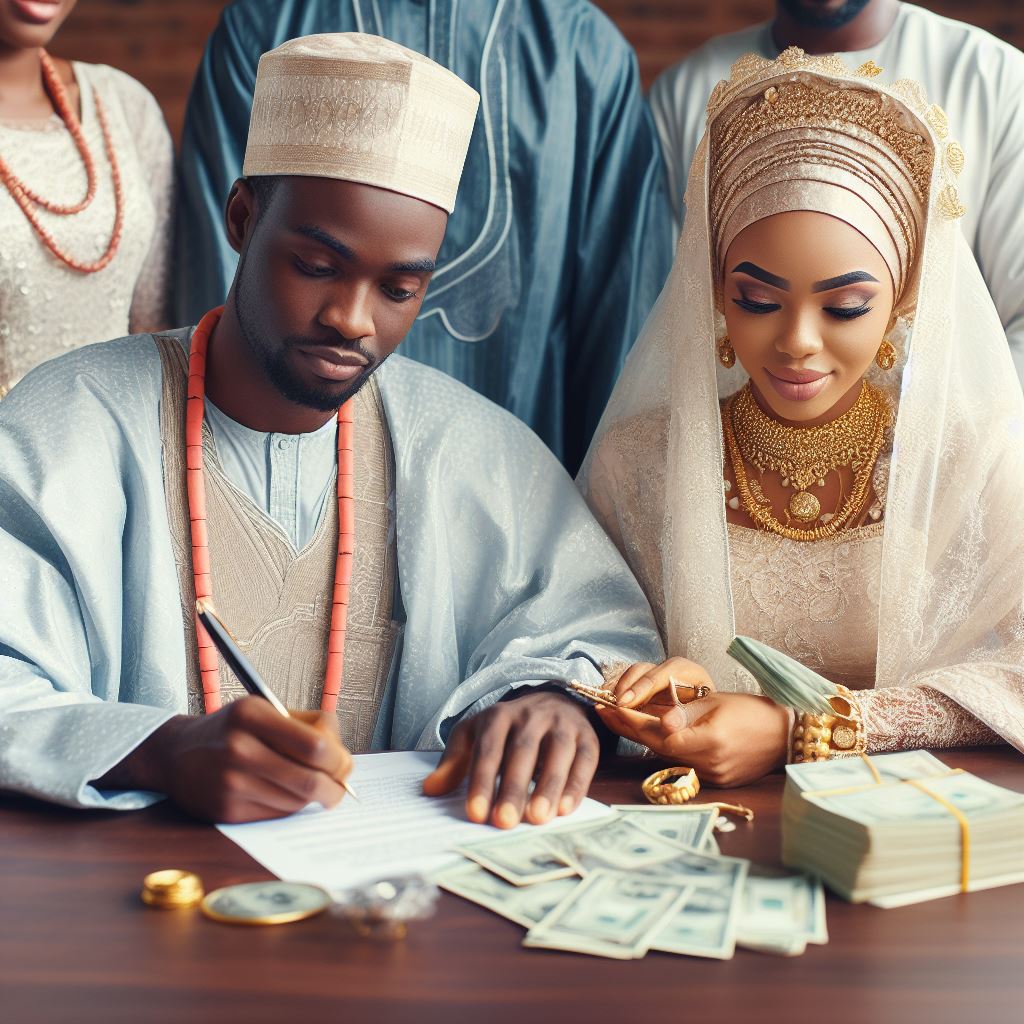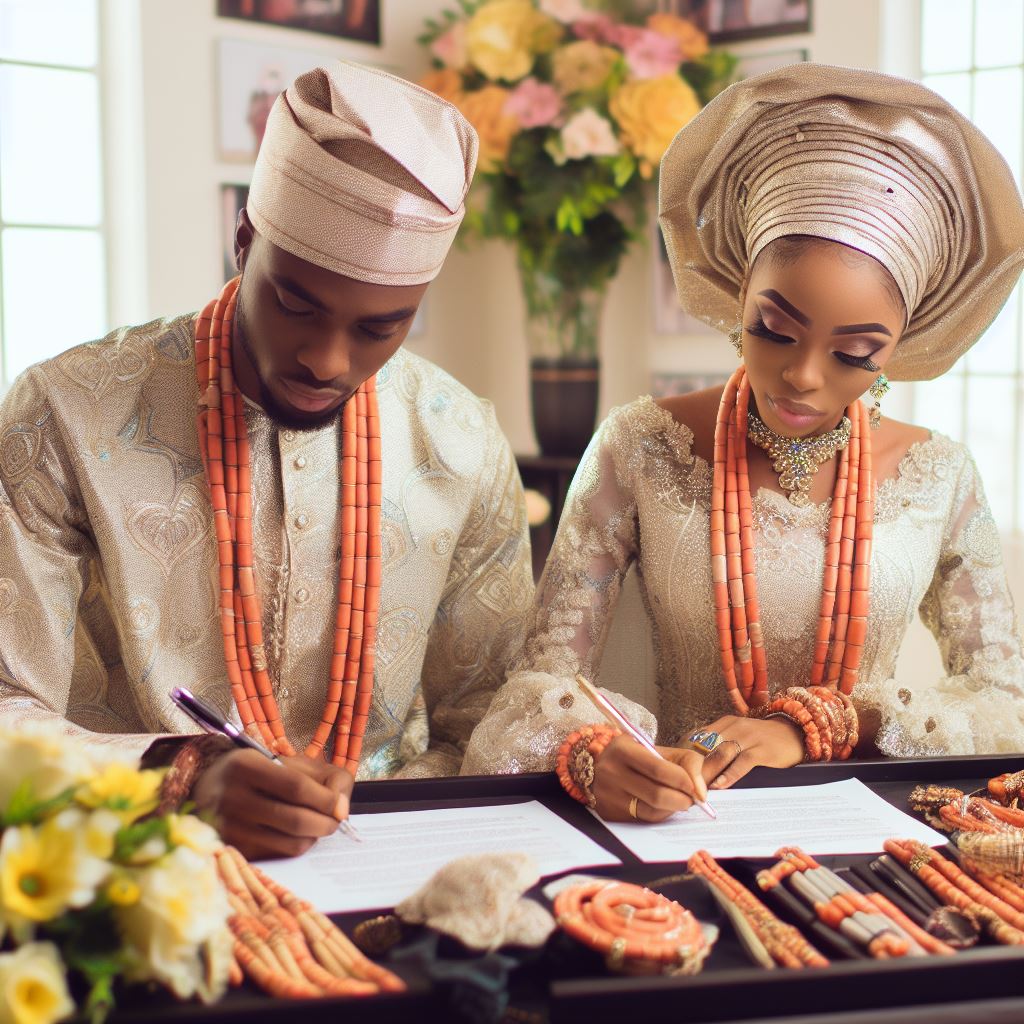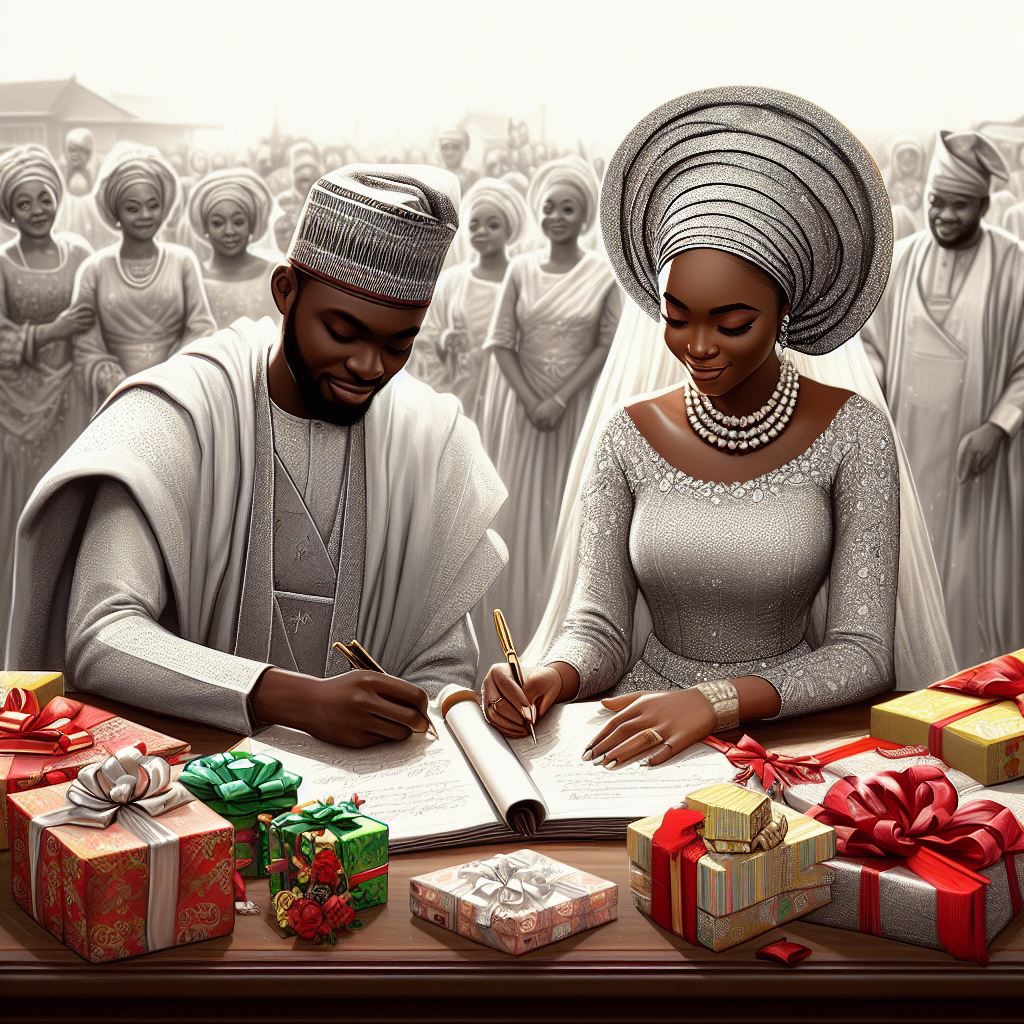Introduction
Nigerian Marriage Customs
Nigerian marriage customs are diverse and deeply rooted in rich cultural traditions.
These customs reflect the country’s multicultural nature, with over 250 ethnic groups each having unique marriage practices.
Importance of Dowry in Nigerian Marriage Agreements
Dowry, an integral part of Nigerian marriage agreements, holds immense significance. It represents a cultural and financial exchange between families.
Dowry can be in the form of cash, livestock, gifts, or other valuables, and it symbolizes the groom’s appreciation and commitment to the bride’s family.
Additionally, the dowry serves as a gesture of the groom’s readiness to shoulder responsibilities in the marriage, and it helps solidify the union by fostering goodwill and cooperation between both families.
Understanding the role of dowry in Nigerian marriages provides insight into the cultural richness and social bonds that underpin these unions.
Historical background of dowry in Nigeria
Origin of dowry in Nigeria
- Dowry in Nigeria has its roots in ancient customary practices of exchanging gifts during marriages.
- These gifts would often include livestock, agricultural produce, and other valuable items.
Evolution of dowry practices over time
- With the influence of Western cultures, dowry in Nigeria began to shift towards a monetary form.
- Money became the primary form of dowry, replacing traditional gifts.
- The amount of dowry required to be paid increased significantly, putting financial strain on families.
- Dowry became a symbol of status and wealth, with extravagant displays becoming more common.
- This shift caused tension within communities, as not everyone could afford costly dowries.
- Dowry negotiations became more complex, involving multiple family members and elders.
- Transactions started to focus on bargaining and negotiation, leading to lengthy and sometimes contentious discussions.
- Dowry payments began to be seen as a form of wealth redistribution within the community.
- Additionally, dowry became a way for families to secure long-term ties and alliances.
- Despite these changes, the core purpose of dowry in Nigeria remained the same – to recognize the value of a bride and her family.
Contemporary dowry practices in Nigeria
- Today, dowry in Nigeria continues to be an essential part of marriage agreements.
- While the form of dowry has evolved, the concept of exchanging gifts or payment remains unchanged.
- The items or money exchanged often vary depending on the region and cultural practices.
- Dowry negotiations are still a significant event and involve extensive discussions between the families.
- In some cases, excessive dowry demands can lead to the cancellation or postponement of marriages.
- Dowry has also become a subject of debate, with some advocating for its abolition due to its financial burden.
- However, others argue that dowry is a cultural tradition that should be preserved and respected.
- Efforts have been made to regulate dowry practices, ensuring fairness and preventing exploitation.
- Some communities have established dowry committees to oversee negotiations and resolve disputes.
- It is important to recognize that dowry practices can vary widely across Nigeria, reflecting the diversity of its cultures.
In short, dowry in Nigeria has a long historical background. It has evolved from traditional gift exchanges to a monetary form, often causing financial strain on families.
Despite changes in its practice, dowry remains a crucial aspect of marriage agreements, reflecting the value of the bride and establishing long-term ties.
While the debate around dowry continues, efforts have been made to regulate and ensure fairness in its negotiations.
Understanding the historical and cultural context of dowry in Nigeria is essential to appreciate its significance in contemporary society.
Read: Marriage Therapy Books: A Resource Guide for Nigerian Couples
Significance of dowry in Nigerian culture
A wedding ceremony in Nigeria is not complete without the exchange of dowry between the bride’s family and the groom’s family.
The practice of giving dowry holds significant importance in Nigerian culture for several reasons:
Symbolic representation of dowry
- The dowry represents the value and worth of the bride in Nigerian society.
- It symbolizes the respect and honor the groom’s family has for the bride’s family.
Demonstration of wealth and status
- The amount of dowry given reflects the wealth and financial capability of the groom’s family.
- It showcases the status and social standing of both families involved in the marriage.
Strengthening ties between families
- The exchange of dowry helps in creating a bond and fostering a positive relationship between the two families.
- It acts as a symbol of unity and signifies the coming together of two families through marriage.
Ensuring financial security for the bride
- Dowry serves as a form of financial security for the bride, especially in cases of divorce or widowhood.
- The dowry ensures that the bride has some financial independence and support in case of any unfortunate circumstances.
In Nigerian culture, dowry is considered fundamental to a successful and recognized marriage.
It is not just a material exchange but carries deep cultural and emotional significance.
The exchange of dowry signifies the coming together of two families, their acceptance of the union, and the commitment to support and care for the bride.
It highlights the importance of family ties, financial security, and social status in Nigerian society.
Read: Novels That Perfectly Capture Nigerian Marriage Dynamics
Determining the value of dowry
Determining the value of dowry in Nigerian marriage agreements is a complex process influenced by several factors:
Factors Influencing Dowry Valuation
- Education and Occupation of the Bride: The bride’s level of education and her occupation significantly affect the dowry amount.
Brides with higher education or prestigious careers may command a higher dowry. - Social Status and Reputation of the Groom’s Family: The social standing and reputation of the groom’s family play a crucial role in dowry valuation.
A family with a respected name often pays a higher dowry. - Negotiation Between Families: Dowry valuation is a result of negotiation between the bride’s and groom’s families.
This negotiation process involves discussions about the bride’s qualities, family background, and the groom’s ability to provide.
Examples of Dowry Customs in Different Nigerian Ethnic Groups
- Yoruba: In Yoruba culture, dowry may include kola nuts, alcoholic drinks, clothes, and other valuable items.
It varies based on the families’ preferences and traditions. - Igbo: Igbo dowry customs involve items like yams, livestock, and cash.
The amount of dowry is negotiable, and both families work out the terms. - Hausa: Among the Hausa people, dowry includes items like jewelry, clothing, and money.
The groom’s family presents these items to the bride’s family. - Edo: Edo dowry customs involve traditional ceremonies and the presentation of gifts like palm wine, kola nuts, and cash.
The value of dowry is often negotiated. - Ibibio: In Ibibio culture, dowry typically consists of items like yams, palm oil, goats, and money.
The bride’s family sets the dowry amount, and negotiation is common.
In each of these ethnic groups, dowry serves as a symbol of respect, appreciation, and commitment in Nigerian marriage agreements.
While the customs may vary, the underlying sentiment of uniting families remains a central aspect of the marriage process.
Read: Marriage Self-Help Books Recommended by Nigerian Therapists

Role of dowry in marriage agreements
In Nigerian culture, dowry plays a significant role in marriage agreements, encompassing various aspects such as legal, protective, and responsible.
Let’s explore each aspect in detail:
Legally binding aspect of dowry
- The exchange of dowry in Nigerian marriages holds legal importance and is recognized by law.
- Both parties involved in the marriage agreement have a legal obligation to honor the dowry.
- Dowry is considered a formal acknowledgment of the union between the families of the bride and the groom.
- Non-compliance with dowry agreements can lead to legal consequences.
- Legal recognition of dowry strengthens the bond between both families and the married couple.
Protecting the bride’s rights and well-being
- Dowry serves as a protective measure for the bride, ensuring her rights and well-being.
- The exchange of dowry signifies the groom’s commitment to providing for his wife throughout their marriage.
- Dowry acts as a form of financial security for the bride in case of unforeseen circumstances.
- It is considered a symbol of respect and appreciation for the bride’s family, recognizing their contribution to the union.
- The dowry also emphasizes the bride’s value and helps prevent mistreatment or neglect from the groom’s family.
Responsibilities of the groom’s family
- The groom’s family has an obligation to fulfill the agreed dowry requirements.
- They must provide the necessary items or amount specified in the dowry agreement.
- The dowry serves as a way for the groom’s family to demonstrate their ability to support the bride.
- It highlights their commitment to the marriage and their willingness to contribute to the bride’s well-being.
- Failure to fulfill dowry obligations may result in strain or conflict between the families.
Legal implications in case of divorce or separation
- In the unfortunate event of divorce or separation, dowry agreements can have legal consequences.
- If the dowry was not fully paid, the bride’s family may have legal recourse to recover the outstanding amount.
- Alternatively, if the dowry agreement was not fulfilled by the groom’s family, they may be held liable.
- Dowry agreements can help establish financial and property rights of the parties involved in case of dissolution.
- Legal implications reinforce the importance of dowry within marriage agreements and its significance in Nigerian culture.
In fact, dowry plays a vital role in Nigerian marriage agreements as it encompasses legal obligations, protection of the bride’s rights and well-being, responsibilities of the groom’s family, and legal implications in divorce or separation.
Understanding the significance of dowry helps uphold traditional values, ensure fairness, and strengthen the foundation of marriages in Nigerian society.
Read: Top 10 Romantic Spots in Nigeria for the Perfect Proposal
Controversies surrounding dowry in Nigerian society
Criticisms against dowry as commodification of women
- Dowry has been criticized for treating women as commodities and objects of exchange.
- Some argue that it reinforces gender inequality and perpetuates the idea that women are possessions.
- It places a monetary value on women, reducing their worth to a material transaction.
- This practice often leads to financial burdens on the bride’s family, creating dependency and inequality.
- Such criticisms emphasize the need to dismantle the dowry system to promote gender equality.
Changing attitudes towards dowry in urban areas
- In urban areas, there is a shift in attitudes towards dowry, with many young couples rejecting the tradition.
- People are becoming more aware of the negative impact dowry can have on women’s lives.
- Urbanization and exposure to progressive ideas challenge the notion of dowry as an essential component of marriage.
- Younger generations are advocating for equal partnerships and are rejecting dowry as a prerequisite for marriage.
- This changing attitude reflects a growing desire for gender equality and empowerment.
Modern alternatives to traditional dowry practices
- As a response to the controversies surrounding dowry, alternative practices are emerging.
- Some couples choose to have a symbolic dowry that promotes equality and mutual respect.
- Instead of exchanging material goods, couples exchange meaningful gifts or engage in symbolic rituals.
- The focus shifts from the monetary value to the sentimental and emotional value of the dowry.
- This transition allows couples to honor traditions while challenging harmful gender norms.
- Modern alternatives aim to create a more egalitarian and balanced approach to marriage agreements.
In general, dowry in Nigerian society is a subject of controversy.
It faces criticisms for commodifying women and perpetuating gender inequality.
However, changing attitudes, especially in urban areas, are challenging the traditional dowry practices.
The emergence of modern alternatives promotes equality and mutual respect in marriage agreements.
As Nigeria progresses towards gender equality, the role of dowry continues to evolve.
Conclusion
Recap of the role of dowry in Nigerian marriage agreements
The role of dowry in Nigerian marriage agreements is significant and deeply rooted in cultural traditions.
Dowry serves as a symbol of a woman’s worth and is seen as a form of security for the bride and her family.
It is a way for the groom and his family to demonstrate their ability to take care of the bride and provide for her.
Furthermore, dowry plays a role in establishing the social status and reputation of both families involved in the marriage.
It also serves as a means of strengthening the bond between the two families and promoting unity within the community.
Acknowledgment of cultural diversity and evolving perspectives on dowry
While dowry is deeply ingrained in Nigerian culture, it is important to acknowledge that perspectives on dowry have evolved over time.
Modern Nigerian society is witnessing a shift towards more egalitarian views on marriage and gender equality.
Many young Nigerians, especially those living in urban areas, are questioning the traditional dowry system.
They believe that dowry can sometimes perpetuate gender inequality and put financial strain on the groom and his family.
There is now a growing movement towards negotiating and redefining dowry to make it more inclusive and fair for all parties involved.
Overall, the role of dowry in Nigerian marriage agreements is complex and multifaceted.
It is deeply intertwined with cultural norms and traditions, but it is also subject to evolving perspectives and societal changes.
As Nigerian society continues to evolve, it is crucial to have open conversations and discussions about dowry to ensure its continued relevance and fairness in modern marriages.




